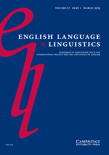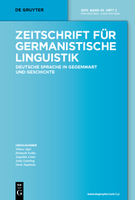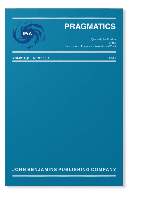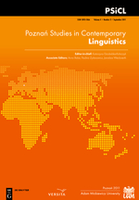
Journal of Greek Linguistics
Scope & Guideline
Celebrating the Vibrant Discourse of Greek Linguistics
Introduction
Aims and Scopes
- Historical Linguistics:
The journal focuses on the evolution of the Greek language from Ancient to Modern times, examining phonological, morphological, and syntactic changes. - Morphology and Syntax:
A significant area of research includes the analysis of morphological structures and syntactic patterns, particularly in Ancient and Modern Greek. - Pragmatics and Discourse Analysis:
The journal explores how Greek is used in various discourse contexts, including the development of discourse markers and the pragmatic functions of linguistic elements. - Comparative Studies:
Research often includes comparative analyses between different dialects of Greek, as well as comparisons with other languages, highlighting unique features of Greek linguistics. - Corpus Linguistics:
Utilizing corpora to conduct empirical studies on language use, distribution, and variation in Greek across different periods. - Tributes and Historical Contributions:
The journal also features obituaries and tributes, acknowledging significant contributions to the field and preserving the legacy of influential linguists.
Trending and Emerging
- Discourse Markers and Pragmatics:
There is a growing interest in the development and function of discourse markers within Greek, reflecting broader trends in linguistic pragmatics and discourse analysis. - Construction Morphology:
The application of construction morphology to Ancient Greek accentuation and other linguistic phenomena is emerging as a significant area of study, showcasing innovative approaches to morphological analysis. - Empirical and Corpus-Driven Research:
An increase in empirical studies utilizing corpus data demonstrates a shift towards data-driven methodologies, enhancing the understanding of language use and variation in Greek. - Interdisciplinary Approaches:
Research that intersects with musicology, history, and other disciplines is becoming more prevalent, indicating a trend towards interdisciplinary studies that enrich the understanding of Greek linguistics. - Focus on Modern Greek:
There is a notable increase in research centered on Modern Greek, including its morphology and syntax, reflecting a renewed interest in the contemporary use of the language.
Declining or Waning
- Traditional Syntax:
The exploration of traditional syntactic theories in Greek has become less prominent, as newer approaches and frameworks gain traction in the field. - Pedagogical Methods in Greek Language Teaching:
Research focused solely on pedagogical methods for teaching Greek has diminished, as the journal increasingly prioritizes theoretical and empirical studies. - Historical Dialect Studies:
While still important, studies centered on individual historical dialects have become less frequent, possibly due to a growing emphasis on broader comparative and theoretical analyses.
Similar Journals

English Language & Linguistics
Unveiling the Nuances of Linguistic ResearchEnglish Language & Linguistics is a prestigious journal published by Cambridge University Press, specializing in the dynamic fields of linguistics and language studies. With an impressive Q1 ranking in both Linguistics and Language categories for 2023 and a notable placement in the Scopus metrics, where it ranks #142 out of 1088 in Arts and Humanities, the journal is recognized for its high-quality research contributions and robust impact in the scholarly community. Since its inception in 1997, English Language & Linguistics has provided a forum for researchers to explore various aspects of language, facilitating the dissemination of innovative ideas and empirical studies. With no open access options currently available, the journal remains a valuable resource within the United Kingdom and beyond, fostering a deeper understanding of language intricacies and their broader societal implications. For practitioners and academicians alike, this journal is a critical resource for keeping abreast of the latest advancements in linguistics.

ZEITSCHRIFT FUR GERMANISTISCHE LINGUISTIK
Fostering Scholarly Excellence in German StudiesZEITSCHRIFT FUR GERMANISTISCHE LINGUISTIK, published by WALTER DE GRUYTER GMBH, stands as a pivotal resource in the field of linguistics since its inception in 1973. With its ISSN 0301-3294 and E-ISSN 1613-0626, this esteemed journal serves as an essential platform for researchers and academics focused on the nuances of the German language and its linguistic frameworks. Catering to a diverse audience, the journal features high-impact articles and contributions consistent with rigorous academic standards, as evident from its Q1 categorization in Linguistics and Language and its notable rankings in both the Arts and Humanities and Social Sciences domains. The journal's commitment to advancing knowledge in linguistics fosters a scholarly environment conducive to both emerging and established linguists. While not available through open access, ZEITSCHRIFT FUR GERMANISTISCHE LINGUISTIK remains influential, drawing readers keen on exploring developmental and educational paradigms alongside linguistic theories. With a convergence of research that spans until 2024, it represents a comprehensive body of work integral to the evolving landscape of linguistic studies in Germany and beyond.

Pragmatics
Bridging theory and practice in pragmatic studies.Pragmatics is a premier international journal dedicated to the exploration and development of the field of pragmatics, published by John Benjamins Publishing Co. This esteemed journal, with an ISSN of 1018-2101 and E-ISSN 2406-4238, offers a vital platform for interdisciplinary research in linguistics, philosophy, and social sciences, making significant contributions to scholarly discourse since its convergence in 2005. Recognized for its high-impact research, Pragmatics boasts a prestigious Q1 ranking in both Linguistics and Language and Philosophy as of 2023, with impressive Scopus rankings that place it in the top percentiles of its categories. The journal aims to enhance understanding of communication in diverse contexts and encourages submissions that reflect innovative theoretical perspectives and empirical findings. Although not an open-access journal, it is essential for researchers, professionals, and students seeking to stay at the forefront of pragmatic studies and related disciplines. With its base in Belgium and an address in Amsterdam, Pragmatics continues to influence global conversations in the humanities and social sciences.

Acta Linguistica Academica
Unveiling Insights in Language and Cultural DynamicsActa Linguistica Academica is a distinguished academic journal published by Akademiai Kiado ZRT, located in Hungary. Since its inception in 2017, the journal has occupied a premier position in its field, achieving Q1 rankings in both Cultural Studies and Linguistics and Language, as well as in Literature and Literary Theory in 2023. With an impressive Scopus ranking placing it in the top percentiles across various categories, Acta Linguistica Academica stands out as a vital resource for researchers, professionals, and students dedicated to exploring the nuances of language, literature, and cultural dynamics. The journal provides a platform for high-quality research and diverse perspectives, facilitating the dissemination of innovative ideas and comprehensive analyses in these disciplines. As an esteemed open-access journal, it ensures that cutting-edge research is readily available to the academic community and the public at large, affirming its commitment to accessibility and knowledge sharing.

GLOTTA-ZEITSCHRIFT FUR GRIECHISCHE UND LATEINISCHE SPRACHE
Advancing Scholarship in Greek and Latin StudiesGLOTTA-ZEITSCHRIFT FUR GRIECHISCHE UND LATEINISCHE SPRACHE, published by Vandenhoeck & Ruprecht GmbH & Co KG, stands as a pivotal academic journal within the field of Classics and Linguistics, demonstrating a strong commitment to advancing scholarly discourse surrounding the Greek and Latin languages. With a respectable Scopus ranking placing it in the top 77th percentile for Classics, this journal facilitates the dissemination of high-quality research and insights relevant to linguists, philologists, and historians alike. The journal operates without an open access model, ensuring its niche scholarship remains exclusive yet profoundly impactful. The HIndex is indicative of its longstanding influence, with the journal traces its roots back to its inception, with weighted contributions across several pivotal years. Furthermore, the journal's current standing—positioned in the Q2 quartile for Classics and Q3 quartile for Linguistics—reflects its thriving relevance and aspiration towards academic excellence, offering a significant platform for the exchange of ideas within the global scholarly community. Researchers, professionals, and students are encouraged to engage with the journal's contributions, as it consistently reflects the evolving dialogue in the study of ancient languages.

Cuadernos de Filologia Clasica-Estudios Griegos e Indoeuropeos
Bridging Ancient Wisdom and Modern InquiryCuadernos de Filologia Clasica-Estudios Griegos e Indoeuropeos, published by Universidad Complutense de Madrid, serves as a vital platform in the fields of Classics and Linguistics. With an ISSN of 1131-9070 and an E-ISSN of 1988-2637, this journal showcases rigorous academic research that spans both Greek studies and Indo-European linguistics. Recognized within the Q1 quartile in Classics and the Q2 quartile in Linguistics and Language, it highlights its standing among peers in these disciplines, particularly reflecting its commitment to advancing scholarly conversation. Though currently lacking in Open Access options, its emphasis on quality content ensures it maintains an intellectual influence, as evidenced by its ranking of #112 in Classics and efforts to engage researchers and students alike. The journal's coverage from 2011 to 2024 positions it as a rich historical resource, while its address in Madrid places it at the heart of European classical studies. By offering insights into the fundamental aspects of language, literature, and ancient cultures, Cuadernos de Filologia Clasica remains a critical resource for those seeking to deepen their understanding of the classical world and its enduring linguistic legacies.

Poznan Studies in Contemporary Linguistics
Advancing understanding in contemporary linguistics.Poznan Studies in Contemporary Linguistics, published by DE GRUYTER MOUTON, is a pivotal journal in the field of linguistics, with an ISSN of 0137-2459 and an E-ISSN of 1897-7499. Located in Germany, this esteemed journal has consistently contributed to the academic landscape since its inception. As of 2023, it holds a Q2 category rank in Linguistics and Language and boasts commendable Scopus rankings, featuring in the 69th percentile for Arts and Humanities and the 66th percentile for Social Sciences. The journal emerges as a vital platform for scholars to explore contemporary linguistic theories and practices, making it an essential resource for researchers, professionals, and students alike. With a converged publication period from 2007 to 2024, it aims to facilitate a deeper understanding of linguistic advancements and trends. While the journal currently does not offer open access, its rigorous peer-review process ensures the highest quality of published research, strengthening its role as a leading discourse in the dynamic field of linguistics.

LATOMUS
Cultivating Insightful Research in the ClassicsLATOMUS is a distinguished academic journal published by Peeters in Belgium, offering a rich platform for scholarly discourse in the fields of Classics, Archaeology, History, Literature, and Linguistics. With the ISSN 0023-8856 and E-ISSN 2294-4427, it has established itself as an essential resource for researchers and professionals seeking to contribute to and engage with critical debates within these disciplines. While not an Open Access journal, LATOMUS is recognized for its robust impact in the academic community, achieving Q2 and Q3 rankings across various categories, including Classics and Archaeology, according to the latest 2023 evaluations. The journal publishes articles that span a range of topics relevant to antiquity and its influences, making it a vital resource for those exploring historical narratives and linguistic developments. As a publication dedicated to advancing scholarly knowledge since its inception in 1971, LATOMUS continues to serve as a cornerstone of academic inquiry within the humanities, promoting intellectual engagement and disseminating high-quality research in its converged years from 1971 to 1974, 1980, and from 2002 to the present.

SKASE Journal of Theoretical Linguistics
Bridging Heritage and Modernity in Linguistic ScholarshipSKASE Journal of Theoretical Linguistics, published by the SLOVAK ASSOCIATION STUDY ENGLISH-SKASE, is a distinguished Open Access journal that expands the horizons of linguistic research and theoretical frameworks. With its ISSN N/A and E-ISSN 1336-782X, the journal has established itself as a pivotal resource for scholars in the field, achieving a commendable Q2 ranking in Linguistics and Language as of 2023. The journal, which has been in continuous publication since 2017, actively publishes innovative research studies, reviews, and theoretical discussions, easing access to groundbreaking work for academics and practitioners alike. Based in Slovakia, it connects a rich heritage of linguistic scholarship and is indexed in Scopus, ranking alongside its peers in both Arts and Humanities and Social Sciences categories. The SKASE Journal of Theoretical Linguistics is crucial for anyone interested in the evolving landscapes of linguistics, serving as an invaluable platform for disseminating knowledge and fostering collaboration amongst researchers worldwide.

Fluminensia
Exploring the Depths of Linguistic and Literary ThoughtFluminensia, published by the University of Rijeka, Faculty of Philosophy, is a distinguished open-access journal that has been contributing to the fields of Linguistics and Literature since its inception in 1999. With an ISSN of 0353-4642 and an E-ISSN of 1848-9680, this journal offers rigorous peer-reviewed articles, fostering an engaging platform for researchers, professionals, and students alike. Recognized internationally, it holds a Q3 ranking in Linguistics and Language and a Q2 ranking in Literature and Literary Theory for 2023, reflecting its significant impact within these fields. Based in Croatia and serving a global academic community, Fluminensia aims to explore innovative theories and methodologies, promoting critical discourse and scholarly exchange. Researchers will find its broad scope inviting, bridging insights across various disciplines in the arts and humanities. Accessible to all, this journal continues to foster an inclusive academic landscape, ensuring that valuable research is widely disseminated and freely available.